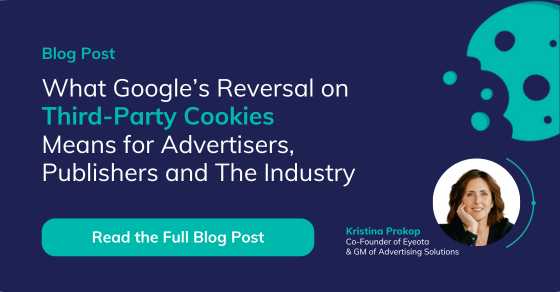After years of preparation and timeline delays, Google’s sudden decision this month to continue support for third-party cookies on Chrome, rather than deprecate them entirely, has ignited a firestorm of reactions and speculation in the digital advertising industry. However, it’s important for advertisers, publishers, and the industry at large to understand that Google’s decision does not alter the overall trajectory of the digital advertising ecosystem.
At its core, Google’s decision to maintain support for third-party cookies and instead provide people with the choice to opt-in or opt-out of third-party cookies for tracking and targeting aligns with the growing emphasis on user privacy and control over personal data.
What does this mean for advertisers and marketers
To thrive in the evolving digital landscape, marketers must navigate the complexities of consumer targeting across diverse channels. Google’s decision to maintain third-party cookies, coupled with the proliferation of new alternative IDs and stringent regional privacy regulations, underscores the challenge of effectively reaching target customers at all touchpoints. Privacy remains a top priority in our industry, and marketers must focus on privacy-compliant, ID-agnostic solutions.
What does this mean for publishers and data providers?
Driving revenue from their first-party data remains a top priority for publishers and data providers. These companies will be best positioned moving forward if they collaborate with data activation and onboarding specialists thatcan facilitate cross-channel ID matching and monetization through any media channel. on a global scale. By delivering audience data powered by multiple identifiers, Eyeota ensures that its data partners can continue to drive revenues through Chrome alongside cookieless browsers, including Safari and Firefox, and cookieless channels such as audio, CTV, digital out-of-home, mobile, and social.
Here are some additional key takeaways from Google’s latest cookie decision that the industry needs to keep in mind as we move forward:
The impact of cookies will still decline. Although Google’s reversal makes cookies a viable identifier in the ecosystem again, it does not change the waning importance of cookies. For multiple reasons, cookies will not regain their previous dominance. These include privacy concerns, the increasing dominance of cookieless media channels (including audio, CTV, digital out-of-home, and social), and the growing adoption of alternative identifiers.
An ID-agnostic approach will be crucial. Regardless of the fate of third-party cookies on Chrome, data strategies need to be ID agnostic. Google’s announcement just maintains cookies as one of many targeting methods.
Naturally cookieless environments are more important than ever. Now is the time to embrace cookieless solutions. Media channels including audio, connected TV, digital out-of-home, and social do not use cookies. Thanks to innovations developed through key industry collaborations, there are privacy-compliant alternative ID solutions that enable addressable cross-channel marketing at scale, even in these cookieless environments.
Diversification is critical. Yes, the third-party cookie remains for now. However, to deliver targeting and personalized experiences to audiences in cookieless channels and on cookieless browsers, including Safari and Firefox, marketers should be using a blend of cookies and alternative IDs.
Data collaboration is paramount. Advertisers and marketers who want to win, with or without cookies, will lean into trusted providers that can enrich and provide insights into their first-party data to enable more effective segmentation, precision targeting, and comprehensive measurement and attribution, ultimately optimizing and improving marketing ROI.
Omnichannel Marketing Solutions at Scale
At Dun & Bradstreet and Eyeota,, we remain committed to delivering privacy-conscious, high-quality data solutions on a global scale. By delivering audience data powered by multiple identifiers, we ensure that brands can continue to reach users who have opted in and out of cookies on Chrome and extend that reach to users on cookieless browsers including Safari and Firefox, and cookieless channels such as audio, CTV, digital out-of-home, mobile, and social.
Our solutions leverage B2B and B2C insights based on socio-demographics, contextual signals, lifestyle data, brand affinities, interests, intent signals, past-purchase behaviors, ownership, and employment data to provide comprehensive insights into a brand’s customers and prospects. Powered by our proprietary ID-agnostic technology, our solutions enable the seamless delivery of omnichannel targeting, enhancing reach, scale, and precision.
Additionally, our data solutions are designed to enrich and provide insights into marketers’ first-party data to enable more effective segmentation, precision targeting, and comprehensive measurement and attribution, ultimately optimizing and improving marketing ROI. By leveraging Dun & Bradstreet and Eyeota’s trusted data solutions, brands and media agencies can navigate the new identity landscape with confidence, ensuring that they engage their ideal audience everywhere.
.svg)
Interested in optimizing your omnichannel targeting strategy with ID-agnostic audience data? Connect with our Data Desk team today!
